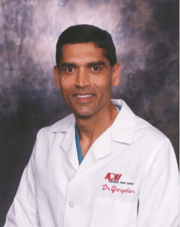 Dr. Deepak Gangahar, professor and chief of the thoracic and cardiovascular surgery section in the UNMC Department of Surgery and a surgeon for The Nebraska Medical Center, will be leaving the medical center on Jan. 9 to return to his former employer, the Nebraska Heart Institute (NHI).
Dr. Deepak Gangahar, professor and chief of the thoracic and cardiovascular surgery section in the UNMC Department of Surgery and a surgeon for The Nebraska Medical Center, will be leaving the medical center on Jan. 9 to return to his former employer, the Nebraska Heart Institute (NHI).
Under a provision in Dr. Gangahar’s medical center contract, NHI had the option to exercise a clause that would allow the institute to bring Dr. Gangahar back to the Lincoln-based group. NHI elected to exercise this option, and thus Dr. Gangahar is obligated to return to NHI.
“We wish Dr. Gangahar well in his return to NHI,” said Glenn Fosdick, president and CEO of The Nebraska Medical Center. “He did an outstanding job over the past year in re-establishing the heart transplant program at the medical center. Thanks to his efforts, the cardiovascular program’s momentum will continue with the vision of becoming the region’s leading heart transplant program.”
Earlier this year, the medical center became accredited with the United Network for Organ Sharing (UNOS) as an approved center for heart transplantation, Fosdick said.
In leaving, Dr. Gangahar said he would continue to be an advocate for the medical center. He said any patients he sees that are in need of a heart transplant, he will direct to the medical center.
“I have been extremely happy at the medical center,” Dr. Gangahar said. “I received tremendous support from Chancellor (Harold M.) Maurer and Glenn Fosdick. Although I was only here for a short time, we were able to accomplish many things.
“The infrastructure of the program has been established. We’ve been able to recruit some outstanding people, and we were able to procure the best equipment for patients in need of mechanical assist devices or undergoing other high-risk procedures. I have every confidence the program will continue to thrive after I’m gone.”
Dr. Gangahar said he is stepping down as chief of the thoracic and cardiovascular surgery section at UNMC, but plans to maintain his surgical privileges at The Nebraska Medical Center. In addition, he will continue to play an active role on the board of the Nebraska Organ Recovery System (NORS). “I will do all I can to enhance organ donation opportunities for Nebraskans who look up to the medical center for organ transplantation,” he said.
Two surgeons – Mohammed Quader, M.D., of NHI, and Rudy Lackner, M.D., a cardiothoracic surgeon at UNMC/The Nebraska Medical Center – have worked closely with Dr. Gangahar and are prepared to continue serving patients. “We’re confident the transition will be a seamless one for our patients,” Fosdick said.
Dr. Quader, who already has an appointment with the medical center, has done heart transplants for three years at The Cleveland Clinic. Dr. Lackner has more than 10 years of cardiothoracic surgery experience and has performed heart and lung transplants.
“We have made tremendous strides in our thoracic and cardiovascular surgery programs under Dr. Gangahar’s leadership,” said John Gollan, M.D., Ph.D., dean of the UNMC College of Medicine. “The groundwork has been laid, and we are now poised to move the program to the next level. We thank Dr. Gangahar for all his efforts over the past year.”
Dr. Gollan said UNMC is recognized for its preeminence in cardiovascular research under the direction of Irving Zucker, Ph.D., professor and chairman of the Cellular and Integrative Physiology Department in the UNMC College of Medicine. Dr. Zucker’s research team, which is housed in the Durham Research Center, recently received a five-year grant totaling more than $10.6 million from the National Institutes of Health (NIH) to study the mechanism for cardiovascular deterioration in heart failure. This is a renewal of a previous five-year grant.
“National trends show that there will be increasing numbers of patients with heart failure,” Dr. Gollan said. “The first approach to treating these patients is with medications, and there is an increasing number of those available. The next phase of treatment is through support devices, essentially an artificial heart approach. Beyond that is heart transplantation. Thanks to Dr. Gangahar’s efforts, we feel we are now prepared to move forward in all of these areas.”
In addition, Dr. Gollan said more than a half-dozen physicians have been recruited by the medical center over the past few years in the areas of heart disease that focus on areas other than heart failure. These areas include imaging techniques to detect disease; non-surgical, vascular treatments of disease; and dealing with abnormal heart rhythms, such as with pacemakers.
UNMC and The Nebraska Medical Center already operate one of the leading solid organ transplant programs in the country. The program currently includes liver, kidney, pancreas and intestinal transplants. The medical center performed two heart transplants in1987 and 29 more between 1994 and 1999.